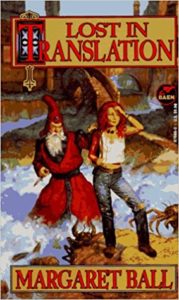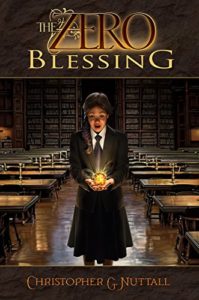Lost In Translation – Margaret Ball
Review by Christopher G. Nuttall
Lost In Translation annoyed and worried me when I first heard of it <grin>.
To cut a long story short, someone asked me – about the same time I was working on Study in Slaughter – if I’d read Lost In Translation. I looked it up and discovered, to my horror, that Margaret Ball had created a plot that – on the face of it – seemed alarmingly similar to Schooled in Magic. In 1995! (Which means she beat JK Rowling too.) I hastily obtained a copy and read it. To my relief, save for a handful of superficialities, Lost In Translation has very little in common with Schooled in Magic.
The plot revolves around a nineteen-year-old Californian girl called Allie, who is the daughter of an immensely rich corporate plutocrat. Unfortunately, there are some things money can’t buy and a decent upbringing is one of them. Allie’s father is a cold, distant man and her mother is apparently out of the picture, forcing her to plunge into the counterculture for solace. Finally, her father – having realised that his daughter appears to have gained nothing from her education save for a string of unsuitable boyfriends – decides that she’ll spend the last years of her education in France. Hopefully, it will make a lady out of her.
Unknown to either of them, Allie is never going to get to France. In another world, an evil sorcerer (he’s the head of a magical college, something which makes the universe read a little odd) has a plan that involves kidnapping someone from our world and using them to gain control of the land-monsters, creatures that manifest whenever blood is spilled. Guess who takes an unexpected side trip? Allie finds herself dragged into a whole new world, then at the centre of a storm as the evil sorcerer’s plot threatens to spill out of control. And yet, she may find more meaning in her life in the other world …
The basic concept isn’t actually bad. And the design of the other world is based more on an American college, rather than the standard British Boarding School. Indeed, in many ways, the story is more of a college/university story than the standard ‘kid goes to boarding school’ story. There are no bullies, for example, save for the evil sorcerer himself. And there are many moments that suggest the book has a very different take on the universe, from magical classes that teach the basics in a manner akin to science class to traditions like slashing one’s gown every time one has sex. (Although the book is very clean, without anything more than a few kisses.) It’s different enough to stand alone.
But it is let down – badly – by the main character. Allie is the living embodiment of the S-T-U-P-I-D joke. (“This man is S-T-U-P-I-D.” So, you think I’m S-T-U-P-I-D, eh?” “Yes.” “It’s lucky for you that I can’t spell!”) It’s easy to agree with her father when he chews her out for learning nothing over the last decade – five years of French Class and she can’t speak the language well enough to make herself understood? She isn’t a spoilt brat, unlike some characters I could name, but she isn’t very clever either. It’s possible that Margaret Ball was making a snide comment on the stereotypical ignorant American aboard, but there comes a time when her lack of intelligence is unbelievable. France is a first-world country, suggestions to the contrary aside. It requires a staggering amount of ignorance to mistake a medieval landscape, complete with medieval facilities, the wrong alphabet and a complete absence of modern technology, for France!
To some extent, she is under a spell to cloud her mind. And yet, this doesn’t account for her sheer stupidity. A class in the magical arts? What sort of place did she think she was going? It takes her far too long to realise that she’s travelled much further than she expected, then she tries to compound the error by going to the wrong person for help. In some ways, the book escapes the standard tropes – Allie’s magical aptitude isn’t revealed until the very end of the story, when she decides to remain in her new world – but in others the book hangs too much on the characters remaining ignorant until it is far too late. Allie is likeable, yet annoying. She just doesn’t think.
Lost In Translation’s story – and the sorcerer’s evil plot – has other problems, partly because the author tried to keep us ignorant as long as possible. We lack the background to understand why certain things matter, including why the sorcerer is launching the plot in the first place. The bad guy is an academic, not a madman out to take over the world. (This makes it hard to tell if he’s evil or simply misguided.) The background draws more on real-life problems in colleges – professors taking advantage of their charges, yet being too well-connected to challenge – than anything else. It’s a refreshing change, but it has its limits. I don’t think it quite makes sense.
Lost In Translation also suffers because of its length. It’s a relatively short book, yet the plot doesn’t really get moving until too late. There is too little action until we get too far along the storyline, then everything gets a little compressed. It should have been expanded, I think, or simply had the first section filtered down into a couple of chapters. It wouldn’t have been that hard to make Allie a smarter character, without making the evil plot impossible.
Overall, Lost In Translation has very few similarities to Schooled in Magic, for which I am truly relieved. However, it has too many weaknesses for me to endorse it wholeheartedly. And while I do understand why an author might want to keep some things hidden until the denouncement, I also feel that too many things are kept hidden for far too long.
*




Leave a comment